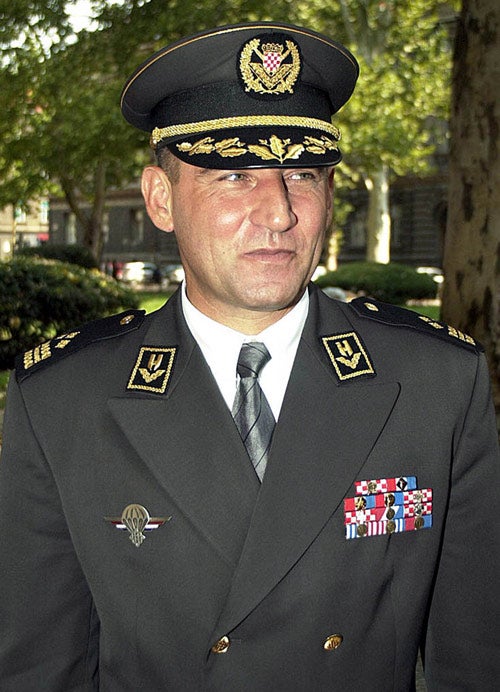Croatian general accused of ethnic cleansing against Serbs goes on trial

The former Croatian general Ante Gotovina has gone on trial in The Hague accused of war crimes and crimes against humanity in one of the most high-profile cases to be heard by the court.
General Gotovina, who is still regarded as a national hero and liberator by many Croatians, sat calmly in the dock together with two close aides, Ivan Cermak and Mladen Markac, accused of the persecution of up to 200,000 Serbs in the rebel enclave of Krajina in a three-month offensive code-named "Operation Storm". The UN prosecutor Alan Tieger said: "This trial arises from the forcible elimination of Krajina Serbs from Croatia and the destruction of their community in August 1995 and the roles and responsibilities of the generals in that process."
The triumphant military operation under General Gotovina's command led to the recapture of Croatia's Serb-held region and practically crushed the four-year rebellion, backed by Belgrade, against the independence of Croatia. It left more than 150 Serb civilians dead, the indictment said. It also ended centuries of Serb history in Croatia, as the Serb community was forced to flee to Bosnia and Serbia. Most of them never returned to their homeland.
The heavy shelling prior to the offensive, "planned and ordered" by General Gotovina, and the looting and torching of Krajina in the aftermath, turned the area into "a scarred wasteland of destroyed homes and villages", said Mr Tieger. The intention was to drive out Serbs from Croatia, he added. "Serbs were in panic-stricken flight, not by accident but by design," he said. "For those who remained, largely the elderly and the infirm, life became a nightmare. While homes and villages were plundered and destroyed on a massive scale, many were murdered."
Mr Tieger added that General Gotovina, a 52-year-old former French Foreign Legionnaire, knew what was likely to happen; failed to take steps to prevent atrocities or stop them; and took no action against those who committed crimes. The prosecution presented video footage of burning Serb houses and the bodies of elderly or disabled Serbs who had been unable to flee and were murdered in their homes.
General Cermak, 58, and General Markac, 52, are accused of ethnic-cleansing operations aimed at forcing the remaining Serbs out of the area. All three denied the charges.
General Gotovina's lawyer, Greg Kehoe, said his client ended the war in Croatia, as he fought against the former Serbian leader Slobodan Milosevic. He claimed his client deserved praise, not a war crimes indictment for his actions. "Gotovina brought Serbs to the negotiating table ... and helped bring about the end of the war," said Mr Kehoe.
General Gotovina was arrested in Tenerife, Canary Islands, in December 2005, where he had been in hiding for four years after the indictment against him became public in 2001. The arrest caused protests in Croatia, where many believe all the actions against the rebellious Serbs were justified. On the other hand, his transfer to The Hague unblocked Croatia's EU membership bid.
After Croatia declared independence from Yugoslavia in 1991, the Krajina Serbs drove out the minority Croat population in a campaign of "ethnic cleansing" that has also led to convictions in The Hague, and proclaimed their own Serb republic. The UN trial is not questioning the legality of the recapture of Krajina, but focusing on the war crimes allegedly carried out during the military campaign. All three accused are charged with participating in a joint criminal enterprise alongside Croatia's late nationalist president, Franjo Tudjman.
The prosecution played a recording of Mr Tudjman, who died in 1999, describing a campaign of disinformation that would pretend to guarantee Serbs civil rights. The recording ended with Mr Tudjman giving what prosecutors called "a knowing laugh". He was also quoted as describing Serbs in Krajina as a "cancer on the underbelly of Croatia", and multi-ethnic states as "unsustainable".
The trial of General Gotovina and his aides has been called the "trial of the century" in Zagreb, where it was broadcast live on Croatian national TV. If found guilty, they face life in jail.
In an ironic twist, the trial opened on the second anniversary of the death of Mr Milosevic.
* The Croatian Prime Minister Ivo Sanader has said that the country should scrap its contested fishing zone in order to join the European Union by 2010.
Mr Sanader said the choice between the zone and the EU was a "clash of two national interests."
"We think that it is more important to complete [EU] negotiations by mid-2009," he said.
Subscribe to Independent Premium to bookmark this article
Want to bookmark your favourite articles and stories to read or reference later? Start your Independent Premium subscription today.

Join our commenting forum
Join thought-provoking conversations, follow other Independent readers and see their replies